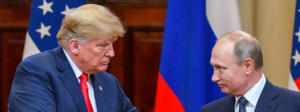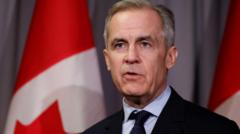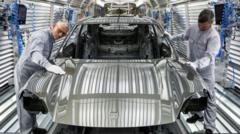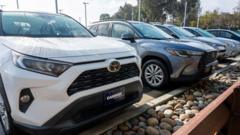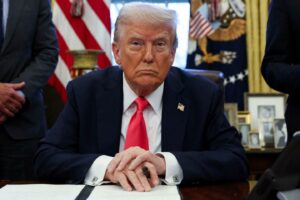With new 25% tariffs on foreign car imports set to begin next week, American car buyers are expressing concern over increased prices and declining affordability. Experts warn that these tariffs could significantly alter the automotive landscape, impacting both domestic and global markets.
Americans Prepare for Economic Fallout from Major Auto Tariffs

Americans Prepare for Economic Fallout from Major Auto Tariffs
As President Trump's tariffs on foreign cars loom, consumers and dealers alike brace for rising prices amidst economic uncertainty.
For two years, Jeannie Dillard has been diligently saving on her fixed income to replace her vehicle that was stolen and found in terrible condition. As she perused used cars at a Virginia dealership, she faced a new wave of anxiety brought on by President Donald Trump’s looming auto tariffs. These blanket tariffs on foreign vehicles and parts, which are due to roll out next week, pose a serious threat to her plans. “If the prices soar, I’ll obviously have to reconsider buying something I can’t afford,” Dillard said, echoing the fears of many other American consumers.
As the White House confirms a 25% import tax on overseas cars and car parts starting from April 2, car enthusiasts and dealers are bracing for economic turmoil. Trump’s administration argues these tariffs will spark "tremendous growth" and boost local employment, but many industry analysts warn of a significant price hike for American drivers. Mohamad Husseini, co-owner of a Maryland used car dealership, anticipates that costs will be passed onto consumers swiftly, predicting that a vehicle with a price tag of $13,000 could see a jump to $14,500 within weeks.
The feeling of urgency is palpable among buyers, with individuals like Robin Sloan quickening their search for cars before tariffs take effect. “With the impending changes, I felt it was essential to start looking now,” she remarked, revealing that she would have otherwise delayed her purchase. Despite the intentions behind the tariffs, she does not believe they will compel consumers to favor US-made cars over foreign options.
Experts emphasize that the impacts of these tariffs will have widespread ramifications far beyond individual buyers. In a country where approximately 92% of households own a vehicle, car ownership symbolizes independence and status. However, the advent of tariffs means that affordable options will likely become scarce, particularly for imports from Korea, which are popular among budget-conscious consumers.
Auto industry historian, John Heitmann, remarked on the existential challenges posed by such tariffs, suggesting that consumer accessibility to vehicles is already limited for many Americans. "Prices will inevitably rise, and the tariffs add uncertainty to the mix,” he highlighted. Additionally, the effects will extend to high-end imports like BMWs and Audis, albeit with those buyers potentially better equipped to absorb the increases.
While projecting losses based on prior import performance, a 2024 US International Trade Commission study anticipates a 75% decrease in imports and a general 5% price increase across the board. Despite strong objections from major manufacturers such as Ford and General Motors, Trump’s tariffs are still set to become a reality. Interestingly, some companies like Hyundai are using the situation to boost local investments, illustrating the complex web of reactions to the tariffs.
As these recommendations set up the auto industry for considerable disruption, it creates an atmosphere of uncertainty for both consumers and manufacturers. Individuals like Mya Fountain-Bunch are taking proactive steps to ensure they navigate the turbulent waters effectively by maintaining their current vehicles and delaying potential purchases until conditions stabilize. Ultimately, the true implications of Trump’s auto tariffs are yet to unfold, leaving both buyers and dealers in a state of anticipation.









